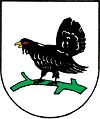Balsbach: Difference between revisions
Knorrepoes (talk | contribs) m (Text replacement - " / Arms" to "/Arms") Tags: Mobile edit Mobile web edit |
Knorrepoes (talk | contribs) m (Text replacement - "{{media}} Literature : " to "Literature : {{media}} ") |
||
| Line 24: | Line 24: | ||
The Capercaillie (or Wood grouse, Auerhahn in German) is used as a canting element, and is shown courting (Balzen in German). The capercaillie was aslready used in the arms of the village from the 19th century. Those arms showed a divided shield, with in the upper part the three swan's necks of the Zwingenberg dynasty and the three blue eagle of the Princes of Leiningen; the historical rulers in the area. | The Capercaillie (or Wood grouse, Auerhahn in German) is used as a canting element, and is shown courting (Balzen in German). The capercaillie was aslready used in the arms of the village from the 19th century. Those arms showed a divided shield, with in the upper part the three swan's necks of the Zwingenberg dynasty and the three blue eagle of the Princes of Leiningen; the historical rulers in the area. | ||
[[Civic Heraldry Literature - Germany|Literature]] : | |||
{{media}} | {{media}} | ||
[[Category:German Municipalities B]] | [[Category:German Municipalities B]] | ||
Revision as of 13:03, 7 September 2022
This page is part of the German heraldry portal |
Heraldry of the World |
|
German heraldry:
|
Selected collector's items from Germany:
|
BALSBACH
State : Baden-Württemberg
District (Kreis) : Neckar-Odenwald Kreis
Incorporated into : 1972 Limbach
| German |
In Silber auf grünem Zweig ein schwarzer Auerhahn. |
| English | No blazon/translation known. Please click here to send your (heraldic !) blazon or translation |
Origin/meaning
The arms were adopted in 1913.
The Capercaillie (or Wood grouse, Auerhahn in German) is used as a canting element, and is shown courting (Balzen in German). The capercaillie was aslready used in the arms of the village from the 19th century. Those arms showed a divided shield, with in the upper part the three swan's necks of the Zwingenberg dynasty and the three blue eagle of the Princes of Leiningen; the historical rulers in the area.
Contact and Support
Partners:
Your logo here ?
Contact us
© since 1995, Heraldry of the World, Ralf Hartemink 
Index of the site












